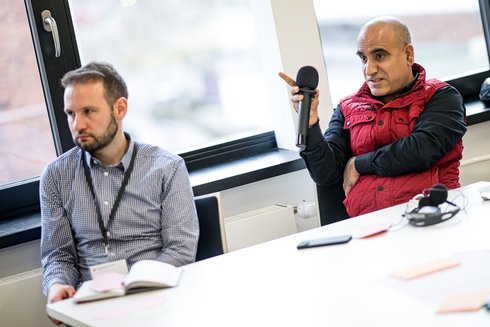Reflections on the German Disaster Risk Reduction Conference in Berlin
At the German DRR 2025 conference, global humanitarian workers gathered, driven by empathy and resilience. Despite funding cuts and global challenges, their determination to innovate and collaborate shone brightly.
Empathy unites us in the face of crisis
Attending the recent German conference on Disaster Risk Reduction (DRR) 2025 in Berlin was nothing short of a profound experience. It felt more like a gathering of solidarity than a conventional DRR conference, especially considering the troubling developments in the humanitarian sector over the past few months.
The air was thick with unspoken emotions, a deep understanding of the challenges we face, and a collective resolve to act for the greater good. In this conference, we witnessed the courage and resilience of humanitarian workers from all corners of the globe. Everybody arrived visibly shaken—disheartened by the fact that nearly 42% of humanitarian funding had been wiped away in an instant sweeping executive order. Yet, despite this setback, these brave individuals continued to engage in meaningful dialogue, tirelessly seeking innovative solutions to sustain and enhance humanitarian action worldwide.
The unwavering determination of the colleagues across the board was a powerful reminder that, despite the chaos surrounding us, empathy remains a guiding light in our mission and work. This sentiment stood in stark contrast to rich and unelected voices like who had declared that there is excessive empathy in the world. The conference somehow reinforced the fact that Empathy drives our volunteering work across the world, and it helps to develop connection and builds trust.
The conferences further delved into various technical sessions, such as use of anticipatory actions in humanitarian response, technology and how in fragile contexts, climate action must focus on strengthening resilience, mitigating risks, and addressing the unique challenges these areas face, including conflict, weak governance, and limited resources.
Apart from the technical aspects discussed at the conference, the experts in attendance condemned several alarming trends that significantly undermine humanitarian responses. These include the abuse of international humanitarian law, disrespect for Red Cross emblems, and a declining sense of global solidarity. Such actions erode the fundamental principles necessary for the protection of civilians and aid workers in armed conflict, as well as the neutrality and impartiality required for effective humanitarian assistance.
Violations of humanitarian principles are particularly concerning. They range from targeting aid convoys to misusing emblems for deception. These actions not only cause direct harm but also erode trust in humanitarian organizations, hampering their ability to deliver aid where it is most needed.
And as I write this blog, the Guardian is reporting as below, five ambulances, a fire truck and a UN vehicle were struck "one by one" in the al-Hashashin area in Palestine, on 23 March, according to a UN official. The fifteen (15) bodies were recovered from a "mass grave."
The severity of the situation is highlighted by a report from the UN Office for the Coordination of Humanitarian Affairs (OCHA), which confirmed that 2024 was the deadliest year on record for humanitarian personnel. The Aid Worker Security Database recorded the deaths of 344 aid workers, surpassing the 2023 total of 280.
Furthermore, the erosion of global solidarity complicates response efforts. It reduces resources, cooperation, and political will, making it increasingly difficult to address crises effectively.
A heartfelt thanks to the German Red Cross and German Federal Foreign Office for organizing the conference with a great composition of panelists and sessions Plans. This was not only the conferences of just experts, but real stakeholders, those who are on the front lines of crisis response—to reflect on crucial topics ranging from climate change to deepening global crises, about fragmented world, we face a crisis not just of resources, but of sympathy and cooperation on a global scale. While title of the conference was from Climate Change to Crisis, Integrating Disaster Preparedness and Climate Action and the discussions on integration and climate action were vital, what truly resonated with me was the stark reality we confronted, the humanitarian system is in turmoil, funding is dwindling, Gaza is in pain, the DRC is suffering, and Sudan battles acute hunger. But, as I looked around, I was filled with hope—seeing these passionate voices united, determined to forge viable solutions to guide us out of this crisis.
Conclusion
As we conclude the conference, we must remember that our collective efforts are more important than ever. It is not just a time for reflection but a call to action. Let us nurture the empathy that fuels our resolve and forge ahead together, advocating for humanitarian principles and striving for a future where solidarity triumphs over adversity.
For us at Diakonie Katastrophenhilfe (DKH), working alongside partners and implementing the Survivor and Community-Led Crisis Response (SCLR) approach—empowering affected communities to lead their own responses to crises by identifying needs, prioritizing actions, and accessing resources—has long been a cornerstone of our work.
Over the years, we have prioritized a locally led anticipatory action approach in our work, together with the Global Network of Civil Society Organizations for Disaster Reduction and its local partners and members and have launched the Locally Led Anticipatory Action Guide and Toolkit.
Built on the pillars of mutual aid and trust, these approaches unleash untapped potential, strengthen local leadership, and enhance disaster management capacities. These approaches demand not just recognition but urgent amplification. In these turbulent times, intensifying this approach is not merely beneficial—it is imperative.
Jalil Lone works with Diakonie Katastrophenhilfe as the Global Adviser for DRR, Climate Change, and Anticipatory Action, based in Berlin.

